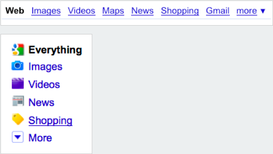Using Google Effectively
Google is a powerful Internet search engine. Are you tapping into all that Google has to offer?
_
_
_
|
Uses:1. Make your search more specific to fine tune the results.
Limitations:1. Just because it's on the Internet, doesn't mean it's true.
2. Be aware of copyright. Documentation:
Links:Google Search Basics
More Google Search Help The Official Google Blog: http://googleblog.blogspot.com Dan Russel’s Blog: http://www.searchresearch1.blogspot.com Lesson plans for teaching -- http://www.google.com/educators/p_websearch.html -- (Search lesson plans) | ||||||
|
_ Blocked Sites
Language Location Safe Search Google Instant: How do I search for images safely? What about copyright? Search Literacy I. Pure Engine Technique A. What’s on a search engine results page? 1. Title _2. Snippet - You can’t just assume you’re getting the
information you think you’re getting from the snippet. The snippet is
just a compression of the contents of the webpage listed.
|
|
3. URL
4. Search refinement suggestions
_II. Search Strategy
A. Keywords
1. Think about what you are trying to find. What could it be?
2. Choose words that you think will appear on the page.
3. Do the search that is most simple and short.
4. Use context terms, ie. don’t just search “blue flower”, search “blue flower henry coe park”
- ex. search “tutorial”, “workbook”, “DIY” (Do It Yourself), “image”, “video”
5. The terms you use will determine the kinds of results you get, ie. use the generic name and you’ll get different results than the scientific name
6. Use synonyms - use the wonder wheel to help
7. If you know a specific term, use it
8. Learn from what you see on the pages you visit
9. Don’t get stuck on a particular term or phrase, be able to reset mentally
10. Domain Knowledge - Know which words we really use, ie. we say “pork” when we eat pig
B. Consider using other content types of searches
1. Images
a. Look at the left hand side of your page to narrow results by size, color, etc.
b. Click on “similar images” under an image that is the type of image you are looking for
c. Conduct an Advanced Search
2. Videos - gives you videos from youtube AND everywhere else on the web
3. Books - Use the My Library function
C. Mashups - combine the results from two different searches
III. Information Mapping
A. When you’re looking to solve a problem, search online for a tool to help you do it.
V. Assessment - Research the credibility of sites you use.
VI. Site-Specific Knowledge - Understand how to search within individual sites
A. Command F
B. Search windows within sites
*Make research be a part of everything you do.
*Teach this attitude to your students.
*Plan on learning new skills.
Boolean Search
"Boolean searching is built on a method of symbolic logic developed by George Boole, a 19thcentury English mathematician. Most online databases and search engines support Boolean searches. Boolean search techniques can be used to carry out effective searches, cutting out many unrelated documents." (from About.com)
AND
OR
NOT
- (MInus Sign)
"(Quotation Marks) Boolean Searching on Tech-RecipesAbout.com: Boolean Search
A. Keywords
1. Think about what you are trying to find. What could it be?
2. Choose words that you think will appear on the page.
3. Do the search that is most simple and short.
4. Use context terms, ie. don’t just search “blue flower”, search “blue flower henry coe park”
- ex. search “tutorial”, “workbook”, “DIY” (Do It Yourself), “image”, “video”
5. The terms you use will determine the kinds of results you get, ie. use the generic name and you’ll get different results than the scientific name
6. Use synonyms - use the wonder wheel to help
7. If you know a specific term, use it
8. Learn from what you see on the pages you visit
9. Don’t get stuck on a particular term or phrase, be able to reset mentally
10. Domain Knowledge - Know which words we really use, ie. we say “pork” when we eat pig
B. Consider using other content types of searches
1. Images
a. Look at the left hand side of your page to narrow results by size, color, etc.
b. Click on “similar images” under an image that is the type of image you are looking for
c. Conduct an Advanced Search
2. Videos - gives you videos from youtube AND everywhere else on the web
3. Books - Use the My Library function
C. Mashups - combine the results from two different searches
III. Information Mapping
A. When you’re looking to solve a problem, search online for a tool to help you do it.
V. Assessment - Research the credibility of sites you use.
VI. Site-Specific Knowledge - Understand how to search within individual sites
A. Command F
B. Search windows within sites
*Make research be a part of everything you do.
*Teach this attitude to your students.
*Plan on learning new skills.
Boolean Search
"Boolean searching is built on a method of symbolic logic developed by George Boole, a 19thcentury English mathematician. Most online databases and search engines support Boolean searches. Boolean search techniques can be used to carry out effective searches, cutting out many unrelated documents." (from About.com)
AND
OR
NOT
- (MInus Sign)
"(Quotation Marks) Boolean Searching on Tech-RecipesAbout.com: Boolean Search








